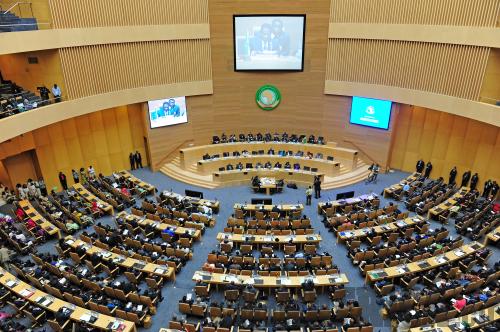|
 |
|
The 18th AU Summit opens on January 29 (DING HAITAO) |
At the two-day 18th African Union (AU) Summit in Addis Ababa, African heads of state gathered to discuss, formulate and adopt three important documents of the framework and strategies for African trade integration, the action plan for boosting intra-African trade, and the monitoring and evaluation mechanism. These documents are closely related to the economic development in Africa.
When the summit closed on January 31, 2012, African leaders reached a wide range of consensus on proposals such as boosting intra-regional trade and accelerating integration construction. They also targeted the establishment of a continental free trade area by 2017, and set an adjustable four-step timetable. The hope is to boost Africa's economy and realize sustainable development through increasing intra-regional trade.
Right time
African unity and integration has long been a dream and goal for African countries and people since they won their independence. The economies of African countries generally have three main characteristics: small economic scale and market, similar economic structures, which lack complementarity (they export low value-added primary products such as agricultural and mineral products), and heavy reliance on importing semi-finished and finished products. Therefore, the only way to break the bottleneck of such economic structure is to establish a supranational economic integration organization to make the market bigger and stronger.
The African economy has grown to some extent over the past decade; but under the impact of economic globalization, the economic gap between Africa and other regions has in fact gradually increased, and some African countries face the risk of being further marginalized. For example, the African trade volume currently only accounts for a little more than 2 percent of the total world trade volume, dropping from 6 percent in 1980. The African population accounts for 12 percent of the world's total, but the continent only attracts 2 percent of the global foreign direct investment, the lowest in the world.
Therefore, to cope with the challenges of globalization and the current turmoil in the international economic environment, African countries need to unite themselves and accelerate the process of economic and political integration to resist the external economic impacts and reduce the negative impact from the international financial crisis. As former AU Commission Chairman Alpha Oumar Konaré once pointed out that without integration, Africa had no future.
Over the past decade, driven by the investment and trade by the Asian emerging economies such as China and India, the African economy has witnessed a stable recovery. According to the AU Commission Chairman Jean Ping, the economy of African countries, on average, has grown by 5.5 to 6 percent in 2011, while in seven countries, the growth rate reached 7 to 11 percent. The International Monetary Fund predicted that the African economic growth rate in 2012 was expected to maintain 6 percent, which is basically the same as that of Asia.
Although the overall development trend is satisfying, statistics from the AU show that the intra-African trade only accounts for less than 10 percent of Africa's total export volume, while the intra-European trade accounts for more than 70 percent of their total export value, and the figure is 45 percent in Asia's developing countries and regions. Africa's trade structure dominated by exporting primary products not only makes the economies of African countries vulnerable to external trade and global economic turmoil, but also hinders the sustainable development of the national and regional economies in Africa.
|